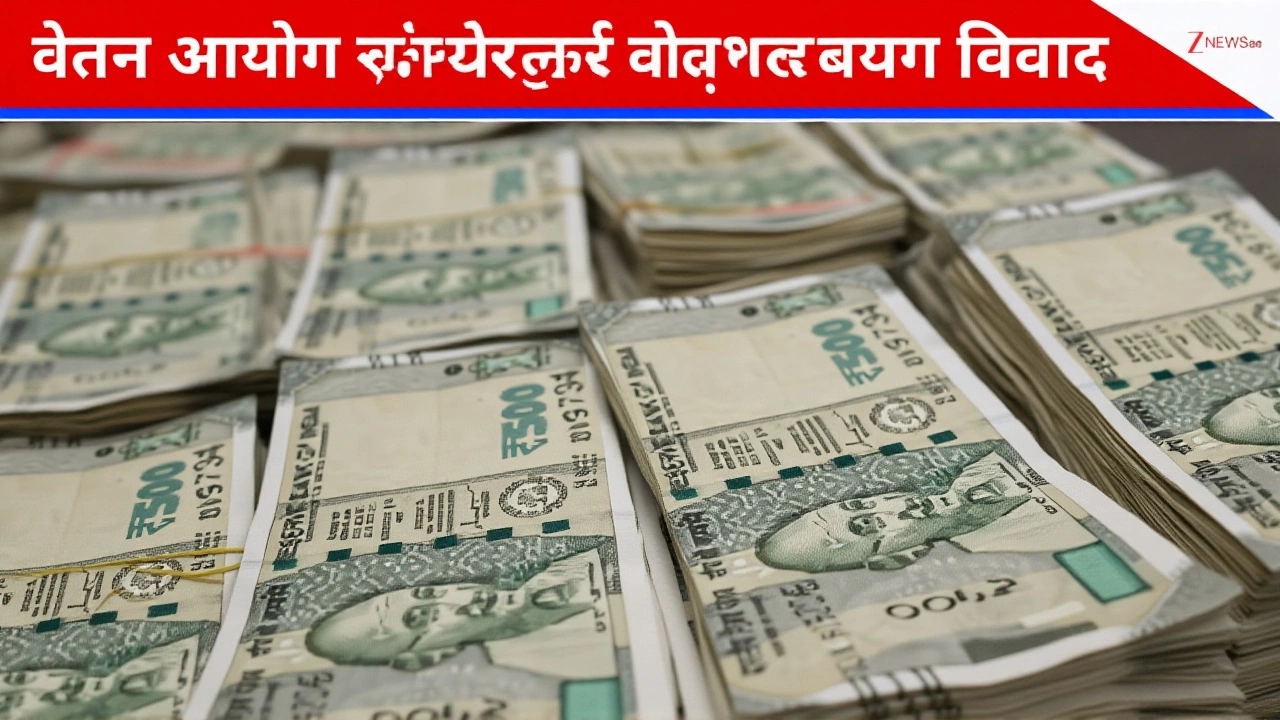The Union Cabinet of India, chaired by Prime Minister Narendra Modi, gave the green light on November 28, 2025, to the 8th Central Pay Commission—a move that will reshape pay and pension structures for nearly 12 million government workers and retirees. Information and Broadcasting Minister Ashwini Vaishnaw confirmed the decision after the Cabinet meeting in New Delhi, adding that the commission’s recommendations are expected to take effect on January 1, 2026. The twist? The Terms of Reference (ToR) don’t actually say that. And that’s causing an uproar.
Who’s Running the Commission—and Why It Matters
Former Supreme Court Judge Justice Ranjana Prakash Desai has been named chairperson, a choice that signals the government’s intent to bring legal rigor to a process historically mired in political compromise. Desai, known for her sharp judgments on social welfare cases, now faces the daunting task of balancing fiscal restraint with the demands of a workforce that’s seen inflation erode real wages for years. The commission’s mandate is clear: review salaries, allowances, and pensions for roughly 5 million central government employees and 6.9 million pensioners. Some estimates, like those from ABP Live, suggest the number could be as high as 25 million when including contract staff and ancillary roles. Either way, this isn’t just a pay hike—it’s a systemic reset.
Why the January 1, 2026 Deadline Is Non-Negotiable for Unions
Here’s the thing: every single pay commission since 1973 has kicked in on January 1. The 7th Pay Commission’s tenure ends December 31, 2025. Logically, the next one starts the next day. That’s tradition. That’s expectation. That’s what employees bank on. But the ToR? It’s silent on the effective date. Instead, it only says the commission must submit its report within 18 months—meaning recommendations could come as late as June 2027. That’s a problem. National Council-Joint Consultative Machinery (NC JCM) and the Central Government Employees and Workers Federation sent urgent letters to Prime Minister Modi and Finance Minister Nirmala Sitharaman on November 21, demanding the ToR be amended to explicitly state the January 1, 2026, start date. "Without this," one union leader told Aaj Tak, "we’re left with a five-month gap where no one knows what their salary will be. That’s chaos."
The Pension Controversy: A Constitutional Right or a Budget Burden?
Even more contentious is the phrase "Unfunded Cost"—a bureaucratic term the government used to describe pension liabilities. Unions say it’s insulting. The Supreme Court of India has ruled that pension is a constitutional right, not a discretionary benefit. Yet the ToR still treats pensions as a fiscal burden. "They’re talking about cost like it’s a loan we took out," said retired Air Force officer Ramesh Chandra, 68, from Chandigarh. "We didn’t ask for this. We served. We followed the rules. Now they’re trying to make us feel guilty for expecting what we were promised."
The unions are also pushing for three other demands: restoration of the old pension scheme (OPS), a mandatory 5% pension hike every five years after retirement, and reinstatement of commutation benefits after 11 years. The 7th Pay Commission scrapped commutation—the option to convert part of the pension into a lump sum—citing fiscal strain. But for thousands of pensioners, that lump sum was how they paid for medical emergencies, home repairs, or their grandchildren’s education. Now, they’re asking for it back.

What the Government Is Saying—and Not Saying
Minister Vaishnaw’s public statement—"the government’s intention is that recommendations be implemented from January 1, 2026"—is carefully worded. "Intention" isn’t a legal commitment. It’s a political signal. And in India’s fiscal calculus, signals can change. The Finance Ministry has repeatedly warned of "fiscal consolidation" amid high public debt. That’s why the term "Unfunded Cost" lingers. The government doesn’t want to lock itself into spending commitments before the commission even begins its work.
NDTV’s analysis points out a deeper tension: the ToR says the commission will consider "cost of living and job responsibilities," but doesn’t explicitly mention pension revision. That’s a red flag. Pensioners are included in the commission’s scope—but their core issue, the structure of their income, is left ambiguous. "It’s like inviting a doctor to treat your broken leg but not letting them look at the X-ray," said economist Dr. Meera Kapoor, who has studied pay commissions since 2008.
What Comes Next: A Race Against Time
Justice Desai’s team has 18 months. That’s less than two years to gather data from 30+ ministries, consult with 20+ employee unions, analyze inflation trends since 2016, and draft a report that won’t trigger a nationwide strike. They’ll need to reconcile two conflicting truths: employees need a raise that keeps pace with the cost of living (which has risen over 35% since 2016, per CPI data), and the government needs to avoid a fiscal shock that could derail infrastructure spending.
Historically, pay commissions have been implemented with retroactive effect. The 7th Pay Commission’s recommendations were applied from January 1, 2016—even though they were approved in 2015. That’s the precedent. But this time, the government is holding back. Is it caution? Or is it a signal that they’re preparing to delay or dilute the recommendations?

Why This Isn’t Just About Salaries
At its core, this is about trust. Government employees didn’t join for riches. They joined for stability, for dignity, for a promise that their service would be honored. When the government says "we intend," but won’t commit, that promise feels fragile. For pensioners—many living on fixed incomes, watching medical bills rise faster than their pensions—it’s personal. One retired teacher from Patna told Pratahkal: "I used to get Rs 22,000 a month. Now, after 12 years, it’s Rs 27,000. My rent is Rs 18,000. What am I supposed to eat?"
This isn’t just a bureaucratic process. It’s a test of whether India’s administrative machinery still values those who keep it running.
Frequently Asked Questions
Why is the January 1, 2026, implementation date so important to employees?
Every Central Pay Commission since 1973 has taken effect on January 1, creating predictable pay cycles. The 7th Pay Commission ended on December 31, 2025, so employees expect the 8th to begin immediately. Without a clear date, they face financial uncertainty, delayed salary adjustments, and potential backpay disputes. The government’s use of "intention" instead of "mandate" adds legal ambiguity.
What does "Unfunded Cost" mean, and why is it controversial?
"Unfunded Cost" is a fiscal term implying pension payments are an unplanned expense. But the Supreme Court has ruled pension is a constitutional right, not a discretionary benefit. Unions argue labeling pensions as "unfunded" undermines their legal status and suggests they’re a burden rather than an earned entitlement. Removing the phrase is seen as acknowledging the moral and legal obligation to pensioners.
Will the 8th Pay Commission restore the Old Pension Scheme (OPS)?
The ToR doesn’t mention OPS, and the government has consistently favored the National Pension System (NPS) since 2004. However, over 1.2 million employees who joined before 2004 still receive OPS, and unions are demanding its extension to newer hires. Whether the commission recommends this depends on its interpretation of fiscal feasibility versus equity. Past commissions have avoided reversing pension schemes, but public pressure may force a rethink.
How will inflation and cost of living be measured for the new pay scale?
The commission will likely use the Consumer Price Index (CPI) for urban and rural areas, along with the All-India Wage Index. Between 2016 and 2025, CPI rose 35.2%, while salaries under the 7th Pay Commission increased by 23% on average. The gap suggests a significant adjustment is overdue. The commission may also factor in regional disparities—salaries in metro cities like Mumbai and Delhi have lost more purchasing power than in smaller towns.
What happens if the commission’s report is delayed beyond 18 months?
The 18-month deadline is a directive, not a legal mandate. Delays are common—7th Pay Commission took 21 months. But prolonged delays risk employee unrest, especially if salaries stagnate. The government may issue interim relief, as it did in 2015, but without a binding timeline, the process loses credibility. Unions have warned of nationwide protests if recommendations are not implemented by July 2026.
Could this lead to similar demands from state government employees?
Absolutely. State governments typically follow the Central Pay Commission’s lead, though they set their own timelines. If the 8th Pay Commission delivers a substantial raise, states like Uttar Pradesh, Maharashtra, and Tamil Nadu will face pressure to match it. Some states, like West Bengal and Kerala, already have their own pay review bodies. A strong central recommendation could trigger a domino effect across India’s public sector workforce.

